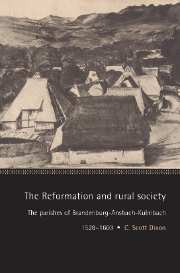Book contents
- Frontmatter
- Contents
- Preface
- Abbreviations
- Introduction
- 1 The emergence and reception of the evangelical movement 1521–1533
- 2 The Lutheran church in Brandenburg-Ansbach-Kulmbach
- 3 The clergyman in context: the extension of the Reformation to the parish
- 4 The Reformation and parish morality
- 5 The acculturation of the parish mind
- Conclusions
- Bibliography
- Index
- CAMBRIDGE STUDIES IN EARLY MODERN HISTORY
3 - The clergyman in context: the extension of the Reformation to the parish
Published online by Cambridge University Press: 03 October 2009
- Frontmatter
- Contents
- Preface
- Abbreviations
- Introduction
- 1 The emergence and reception of the evangelical movement 1521–1533
- 2 The Lutheran church in Brandenburg-Ansbach-Kulmbach
- 3 The clergyman in context: the extension of the Reformation to the parish
- 4 The Reformation and parish morality
- 5 The acculturation of the parish mind
- Conclusions
- Bibliography
- Index
- CAMBRIDGE STUDIES IN EARLY MODERN HISTORY
Summary
THE CLERGY
In Praise of Folly Erasmus took aim at the Scholastics. He ridiculed the maxims, paradoxes, ‘tortuous obscurities’, and ingenious subtleties spun in the schools of theology, and he scoffed at the Scholastics for seeing themselves as a new Atlas, bearing the weight of the Church ‘on the props of their syllogisms’. Yet for all her wit and satire, Erasmus's Folly said very little about the parish clergy of her age. The early Reformers did not miss the chance, however, and a bitter polemical war was waged in the first few decades of the evangelical movement directed at the laxities and failings of the Catholic clergy. Nor was it sheer invention. Medieval Christendom witnessed its share of clerical abuses: absenteeism, pluralism, ignorance, exploitation of excommunication or the sacraments, and moral failings such as drinking, fighting, blasphemy, and sexual licence. No doubt the parishioners of Ansbach and Kulmbach witnessed the same misemployments. A 1480 visitation in the neighbouring diocese of Eichstätt revealed that the clergy were heavy drinkers of wine, frequented the inns, gambled, fought, danced, and paid little heed to their vow of chastity. With all this evidence in her favour, why did Folly not ridicule the parish priest? Erasmus recognised, perhaps, that the Catholic clergyman had little scope for true folly; the range of his duties was tightly circumscribed by the dictates of the medieval church.
The range of tasks facing a late-medieval clergyman was limited to a prescribed ritual. Once invested, he was saddled with cura animarum et custodia reliquiarum: he had to perform the requisite sacerdotal services – inter alia, the mass, baptism, extreme unction, confession – and satisfy the demands of his immediate religious community, which might mean honouring local saints or venerating the parish relics.
- Type
- Chapter
- Information
- The Reformation and Rural SocietyThe Parishes of Brandenburg-Ansbach-Kulmbach, 1528–1603, pp. 66 - 101Publisher: Cambridge University PressPrint publication year: 1995



